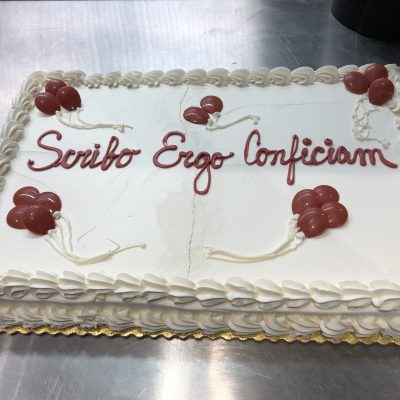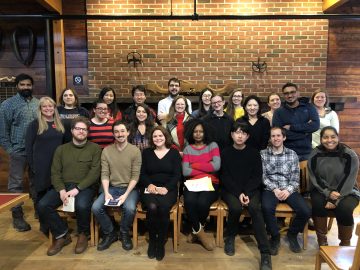Boot Camp Encourages Productivity

By Katya Hrichak
“Why do you feel you’re not ready to write?” asked Associate Dean Jan Allen at a recent Graduate School Proposal, Thesis, and Dissertation Writing Boot Camp.
“Do you feel like you haven’t read enough, like you haven’t done enough experiments, you haven’t run enough analyses? One of the ways that you know whether that’s true is to start writing.”
Developed by Cornell’s Graduate School as one of several academic writing support programs, Writing Boot Camp helps students identify strategies to be more productive writers while engaging in a supportive writing community that lasts beyond Boot Camp.
Enrolled students had the option of participating in four-, five-, or six-day sessions, held concurrently in mid-January at the Big Red Barn Graduate and Professional Student Center (BRB).
After a morning spent writing, students shared their successes, challenges, and strategies for improvement and cheered each other on as they learned better writing practices. The supportive group atmosphere, according to Allen, is a large part of why many students find Boot Camp successful.
“It was a great environment for writing a rough draft. Being surrounded by other people working on their work was helpful and kept me focused,” said David Ekman, a doctoral candidate in operations research and information engineering.
Since the first Boot Camp in 2013, the number of interested participants has grown. This year was the largest group yet with 72 students pre-registered.
“I mostly participated to motivate myself,” said Eugene Law, a doctoral student in soil and crop sciences. “I did my A Exam back in the end of December, and I just needed something to push me into the new semester. I think that that has worked. I’ve gotten enough momentum going that things are progressing.”
Support does not stop when Boot Camp concludes. “Reboots” are offered on a monthly basis for the rest of the semester, allowing students to continue their discussions, mutual support, and communal writing.
“Most students say they’ve never been as productive as they are in Boot Camp,” Allen said. “They identify and practice strategies that increase their confidence and productivity and find supportive writing partners or writing groups. They also learn to think about writing as a process that they can analyze.”
Katya Hrichak is a communications assistant in the Graduate School.

